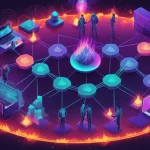DAOs: Blockchain’s $20B Revolution Stuck in Legal Limbo

DAOs: Redefining Corporations in a Legal Wild West
Decentralized Autonomous Organizations (DAOs) are tearing down the walls of traditional corporate structures, replacing boardrooms and CEOs with blockchain-based, code-driven governance. Managing over $20 billion in assets, they’re a bold experiment in community ownership and borderless collaboration—yet most legal systems don’t even acknowledge their existence, leaving them stranded in a regulatory no-man’s-land.
- Financial Heavyweights: DAOs control over $20 billion in assets but lack legal recognition.
- Regulatory Gap: Without legal status, they can’t contract, pay taxes, or protect members from liability.
- Path Forward: Concepts like “digital fiduciaries” and a “DAO passport” could legitimize their role.
DAOs represent a seismic shift in how we think about organizations. Built on blockchain technology, they operate through smart contracts—think of them as digital vending machines that automatically execute agreements once conditions are met, no middleman required. These self-enforcing rules, or “on-chain rules,” act like a digital constitution, dictating how decisions are made, funds are allocated, and power is distributed without a central authority. For the uninitiated, a DAO is essentially a group of people coordinating globally via the internet, using tokens to vote and a transparent ledger to track every move. It’s a middle finger to the suits and skyscrapers of corporate America, promising a future where anyone with a wallet can have a stake. As Miloš Jakovljević, a legal and compliance expert at B2BINPAY and member of the Bar Association of Serbia, sharply observes:
“In fact, DAOs aren’t a small experiment, as they hold over $20 billion in liquid assets, yet, in the eyes of most legal systems, they barely exist.”
What Makes DAOs Revolutionary?
The allure of DAOs lies in their rejection of hierarchy. No CEO, no headquarters—just code and community. Token holders act as both shareholders and decision-makers, voting on proposals from funding new projects to tweaking governance rules. With over 6,000 active DAOs today, spanning decentralized finance (DeFi) platforms like Uniswap to social experiments like ConstitutionDAO, they’re proving that collective action can scale globally. This isn’t just tech for tech’s sake; it’s a blueprint for a borderless economy where transparency isn’t a buzzword but a hardcoded reality.
Yet, let’s pump the brakes on the hype train. While DAOs promise a democratic utopia, the reality can be uglier. Token-based voting often means the biggest wallets—aka “whales”—call the shots. A study of major DAOs revealed that in some cases, just 1% of holders control over 50% of tokens, turning “community ownership” into a fancy label for plutocracy. Is this really the decentralization we’re cheering for, or just old power dynamics in a shiny new wrapper? Jakovljević cuts to the chase:
“When no one is truly accountable, ‘community ownership’ becomes a performance.”
Legal Limbo: A System Not Built for Code
The biggest roadblock for DAOs isn’t tech—it’s the law. Traditional legal systems are wired for entities with physical addresses and clear leadership, not borderless, leaderless networks. Without recognition as a legal entity, DAOs can’t sign contracts, file taxes, or shield their members from personal liability. Imagine a DAO getting hacked for millions—every token holder could be personally sued or taxed for the fallout. This isn’t theoretical; it’s a ticking time bomb. Jakovljević nails the disconnect:
“Token holders might feel like owners, yet under the law, they’re not.”
Some jurisdictions are waking up to the challenge. Wyoming in the U.S. and the Marshall Islands have passed laws allowing DAOs to register as unique entities, a small but significant step. Switzerland’s “Crypto Valley” and Singapore’s fintech-friendly policies also offer glimmers of hope for DAO legitimacy. But these are exceptions in a sea of indifference—or outright hostility, as seen in China’s blanket crypto bans. For most DAOs, the workaround is to “wrap” themselves in traditional structures like LLCs or foundations to interact with the real world. Sounds clever, until you realize it’s a brutal showdown: the DAO’s code says one thing, but the law demands another. Multi-jurisdictional headaches ensue when a global entity gets snagged by local rules. As Jakovljević puts it:
“Legal wrappers often clash with on-chain rules, leaving the community to choose between code and compliance.”
The Crushing Cost of Compliance
Compliance isn’t just a bureaucratic annoyance—it’s a financial sledgehammer. Setting up and maintaining legal wrappers can cost hundreds of thousands of dollars, a death sentence for smaller DAOs with limited resources. Many are forced to delay product launches, block U.S. users to dodge regulatory heat, or relocate offshore to friendlier shores. Innovation gets smothered before it can spark. Even the big dogs aren’t spared. Take Uniswap, a leading DeFi protocol governed by a DAO. Their recent “DUNI” proposal allocates a staggering $16.5 million in UNI tokens purely for taxes and legal defense, with potential IRS liability estimated under $10 million. This isn’t chump change; it’s a glaring neon sign that even DeFi giants are buckling under regulatory weight. Imagine a small DAO trying to scrape together funds for a similar defense—good luck.
Here’s the kicker: these costs don’t just hurt wallets; they betray the ethos of decentralization. Shelling out six figures to lawyers just to exist? That’s not the freedom we signed up for. It’s a bitter irony that the very systems DAOs aim to disrupt—centralized gatekeepers—are the ones they must grovel to for survival.
Lessons from the Past: When DAOs Go Wrong
If legal gaps weren’t enough, history offers stark warnings about DAO vulnerabilities. Rewind to 2016 with The DAO, one of the first major experiments on Ethereum. It raised $150 million in Ether to fund projects—until a smart contract bug let a hacker drain $50 million. The fallout was catastrophic, leading to a contentious Ethereum hard fork to recover funds, splitting the community and birthing Ethereum Classic. This wasn’t just a tech failure; it exposed how untested governance and buggy code can tank even the most hyped projects. Fast forward to today, and while security has improved, risks remain—smart contract flaws, whale dominance, and regulatory crackdowns are ever-looming threats. DAOs aren’t a magic bullet; they’re a high-wire act.
Forging a New Path: Solutions for DAO Legitimacy
So, how do we drag DAOs out of this legal swamp? Patching old laws won’t cut it; we need a framework built for decentralization from the ground up. Jakovljević proposes two intriguing ideas. First, “digital fiduciaries”—roles defined in code but legally accountable, ensuring someone (or something) answers for decisions. Think of it as a digital stand-in for a board member, baked into the smart contract. Second, a “DAO passport,” a global standard for transparency and liability protection, allowing cross-border recognition without the usual jurisdictional mess. These aren’t wild fantasies; they’re practical steps to make DAOs accountable without strangling their spirit. Jakovljević drives the point home:
“What DAOs need is a regulatory framework built for decentralization itself.”
Let’s be real, though—getting global agreement on something like a DAO passport is like herding cats on a blockchain. Governments move at a snail’s pace compared to crypto’s breakneck speed. And there’s a darker side: overregulation could neuter DAOs, turning them into glorified corporations with extra steps. The balance between legitimacy and freedom is razor-thin.
DAOs and Bitcoin: Allies or Distractions?
For Bitcoin maximalists, DAOs might seem like a sideshow to BTC’s core mission as sound money. Bitcoin’s beauty is its simplicity—no governance drama, no voting, just immutable code and scarcity. DAOs, often built on Ethereum or other programmable blockchains, are a messy social experiment by comparison. Bitcoin doesn’t need to “organize” anything; it just works. But here’s the flip side: DAOs tackle a niche Bitcoin ignores—collective action and programmable governance at scale. They’re not rivals but complementary tools in the fight against centralized control. Ethereum’s role as a DAO platform doesn’t diminish Bitcoin; it expands the battlefield for decentralization.
Still, let’s not drink the Kool-Aid. DAOs aren’t a utopian fix for everything wrong with the world. Too many have been playgrounds for whales, scammers, and rug-pull artists. The crypto community on Twitter and Reddit is split—Ethereum fans hail DAOs as the killer app, while Bitcoin purists roll their eyes at the overengineered chaos. Both sides have a point, but pretending DAOs are flawless is just shilling nonsense. They’re a work in progress, full stop.
Key Takeaways and Questions on DAOs in Blockchain
- What are DAOs, and why are they a big deal in blockchain tech?
DAOs, or Decentralized Autonomous Organizations, are blockchain-based groups using smart contracts for transparent, community-driven governance. They’re a big deal because they manage over $20 billion in assets and challenge traditional corporate models with borderless, decentralized coordination. - Why are DAOs trapped in a legal gray zone?
Most legal systems don’t recognize DAOs as entities due to their lack of physical presence or defined leadership. This means they can’t sign contracts, pay taxes, or protect members from personal liability, creating massive risks and accountability gaps. - How do compliance costs cripple DAO innovation?
Legal structures like LLCs rack up huge costs and clash with on-chain rules, forcing smaller DAOs to delay projects or move offshore. Even giants like Uniswap allocate millions—like $16.5 million in the DUNI proposal—for taxes and legal defense. - What solutions could integrate DAOs into the legal world?
Ideas like “digital fiduciaries” for coded accountability and a “DAO passport” for global transparency and recognition could make DAOs legitimate. These aim to balance their decentralized nature with real-world responsibility. - Do DAOs complement or conflict with Bitcoin’s vision?
DAOs complement Bitcoin by focusing on governance and collective action, often on platforms like Ethereum, while Bitcoin sticks to being sound money. They’re parallel experiments, each disrupting centralized systems in unique ways—though DAOs carry more governance baggage.
What’s Next for DAOs?
The road ahead for DAOs is a minefield of opportunity and peril. Upcoming legislation in places like Wyoming could set precedents, while major projects like MakerDAO and Aragon continue to test governance at scale. But risks loom large—smart contract bugs, scalability limits, and regulatory overreach could derail the experiment. If the law can’t adapt, DAOs risk staying a gray-zone sandbox for insiders and scammers. But if regulators match the pace of innovation, we might see the corporate world flipped upside down, as explored in this insightful opinion piece on DAOs redefining corporations. Jakovljević captures the stakes perfectly:
“If the law can’t adapt, DAOs remain a gray-zone tool for insiders. But if regulators step up, DAOs could evolve into the next layer of the global economy — open, borderless, and accountable by design.”
DAOs might be the future of how we work, fund, and govern—but are we ready to bet on a system the law can’t even define? Time, and code, will tell.



